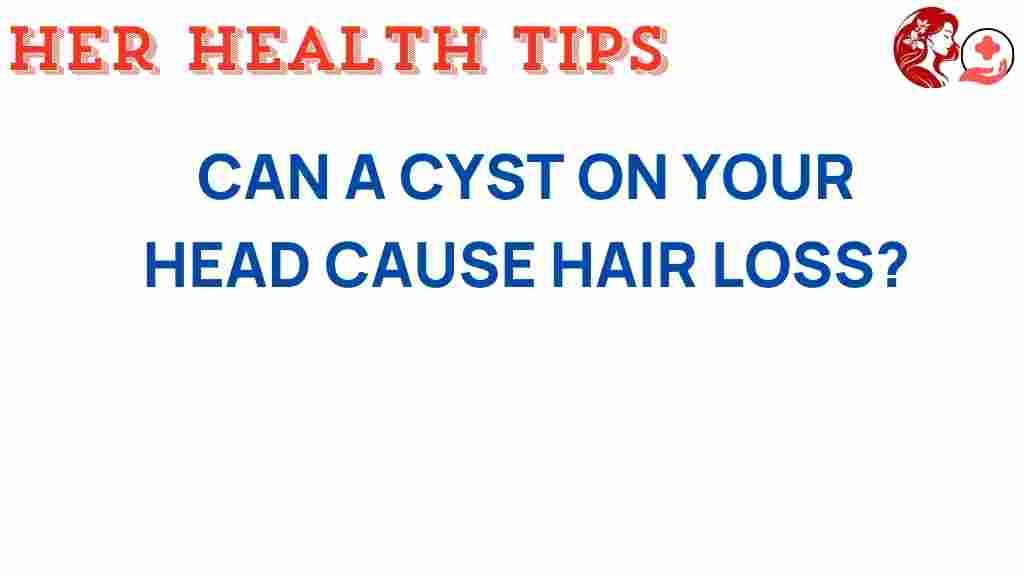Uncovering the Truth: Can a Cyst on Your Head Lead to Hair Loss?
When it comes to maintaining healthy hair, many factors come into play, including genetics, diet, and scalp conditions. One question that often arises is whether a cyst on your head can lead to hair loss. Understanding the relationship between cysts, scalp health, and hair follicles is essential for anyone concerned about hair loss. In this article, we will explore the types of cysts that can develop on the scalp, their potential impact on hair loss, and treatment options available. We will also provide medical advice and troubleshooting tips to help you maintain a healthy scalp.
Understanding Cysts and Their Impact on Hair Loss
A cyst is a sac-like structure filled with fluid or semi-solid material that can develop in various parts of the body, including the scalp. The most common types of cysts found on the scalp are:
- Epidermoid cysts: These are small, round lumps that can develop due to blocked hair follicles and are often harmless.
- Pilar cysts: Typically found on the scalp, these cysts originate from hair follicles and are usually filled with keratin.
- Steatocystomas: These cysts are related to sebaceous glands and can occur anywhere on the body, including the scalp.
While cysts themselves do not typically cause hair loss, they can contribute to scalp health issues that may lead to hair follicle damage or inflammation.
The Connection Between Scalp Health and Hair Follicles
Hair follicles are the tiny structures in the skin that produce hair. For hair to grow properly, the follicles must be healthy and free from obstruction. Here’s how cysts can indirectly affect hair loss:
- Inflammation: Cysts can cause localized inflammation, which may affect the surrounding hair follicles and lead to temporary hair loss.
- Blockage: If a cyst grows large enough, it may physically obstruct nearby follicles, hindering their ability to produce hair.
- Infection: In some cases, cysts can become infected, leading to more significant scalp issues and potential hair loss.
Therefore, maintaining good scalp health is crucial for preventing hair loss, and addressing any cysts or skin conditions promptly can help protect your hair follicles.
Common Skin Conditions That Affect Scalp Health
Several skin conditions can impact scalp health and, consequently, hair loss. Understanding these conditions is vital for effective treatment and prevention:
- Dermatitis: This inflammation of the skin can cause itching, redness, and flaking, affecting hair growth.
- Psoriasis: A chronic skin condition characterized by red, scaly patches that can also appear on the scalp and lead to hair thinning.
- Folliculitis: An infection of the hair follicles that can cause red bumps and discomfort, potentially leading to hair loss.
- Acne: While commonly associated with the face, acne can also occur on the scalp, leading to inflammation and hair loss.
Addressing these skin conditions with proper treatment options is essential for maintaining scalp health and preventing hair loss.
Treatment Options for Cysts and Scalp Health
If you have a cyst on your head or are experiencing hair loss, several treatment options can help improve your scalp health:
1. Lifestyle Modifications
Simple lifestyle changes can significantly enhance scalp health:
- Maintain a Healthy Diet: A balanced diet rich in vitamins and minerals supports hair and scalp health. Foods high in omega-3 fatty acids, zinc, and vitamins A, C, and E are particularly beneficial.
- Stay Hydrated: Drinking plenty of water helps keep your skin and scalp hydrated.
- Reduce Stress: High-stress levels can contribute to hair loss. Consider stress-reducing activities such as yoga, meditation, or regular exercise.
2. Medical Treatments
Depending on the severity of the cyst or underlying skin condition, various treatments may be necessary:
- Topical Treatments: Over-the-counter creams containing salicylic acid or benzoyl peroxide can help reduce inflammation and clear clogged pores.
- Prescription Medications: If the cyst is infected or causing significant issues, a dermatologist may prescribe antibiotics or corticosteroids.
- Cyst Removal: In some cases, surgical removal of the cyst may be necessary, especially if it is causing discomfort or affecting hair growth.
3. Regular Scalp Care
Implementing a regular scalp care routine can also promote scalp health:
- Gentle Cleansing: Use a mild shampoo to cleanse your scalp regularly, keeping it free from excess oil and dirt.
- Exfoliation: Regularly exfoliating the scalp can help remove dead skin cells and prevent clogged follicles.
- Moisturizing: Use scalp treatments or oils to keep the scalp hydrated and healthy.
Seeking Medical Advice
If you are experiencing persistent cysts or hair loss, it’s crucial to seek medical advice from a dermatologist. They can provide a thorough examination, diagnose any underlying conditions, and recommend appropriate treatment options tailored to your needs.
Troubleshooting Tips for Cysts and Hair Loss
If you notice cysts forming on your scalp or are experiencing hair loss, consider the following troubleshooting tips:
- Monitor Changes: Keep track of any changes in your scalp condition, including new cysts, redness, or itching.
- Avoid Picking: Resist the urge to pick at cysts or inflamed areas, as this can lead to infection and worsen hair loss.
- Maintain Hygiene: Regularly wash your hair and scalp to keep them clean and free of excess oil that can contribute to cyst formation.
- Consult Experts: If over-the-counter treatments aren’t effective, consult a dermatologist for specialized care.
Conclusion
In summary, while a cyst on your head may not directly cause hair loss, it can lead to conditions that affect scalp health and hair follicles. Understanding the types of cysts, their potential impact on scalp health, and the available treatment options is crucial for anyone concerned about hair loss. By maintaining a healthy lifestyle, practicing good scalp care, and seeking medical advice when necessary, you can ensure your scalp remains healthy and your hair thrives.
For more information on hair health and skin conditions, consider visiting reputable dermatology resources or consulting with a qualified dermatologist.
This article is in the category Conditions and created by HerHealthTips Team
